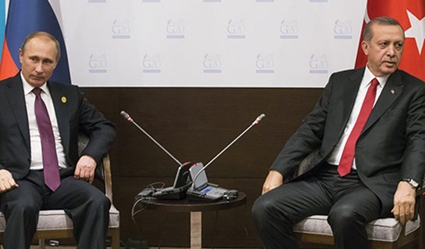Turkey’s Cooperation with Russia Unlikely to Influence Ankara-Tbilisi-Baku Alliance
Op-Ed
Russia and Turkey have recently enjoyed a definitive improvement in bilateral relations ever since the downing of a Russian plane by the Turks in the skies of Syria in late 2015. On the surface, the rapprochement which is reflected in constant exchange of supportive diplomatic statements and bilateral visits might indeed have repercussions on a wider region which the two states border on. Analysts in the Caucasus have become alarmist over the recent period as to how far Russia-Turkey cooperation might go, with some supposing that Georgia and the rest of the South Caucasus will be negatively affected.
It will be shown though, that the Russia-Turkey cooperation is rather an ‘alliance of convenience’ based on current circumstances. Deep inside, both countries actually share fundamental differences which will make it unlikely for Turkey to abandon its geopolitical outlook for the South Caucasus.
First, we must outline the reasons for nascent Russia-Turkey cooperation. Turkey’s foreign policy has been evolving over the past several years and the reason for this is the ongoing conflicts in Iraq and Syria. A look at the map of the Middle East shows that most of Turkey’s borders are in the Middle East, making it in Turkey’s natural interests to be actively involved in the neighborhood. This, from a geopolitical perspective, clashes with what Russia pursues in Syria, but there have been interesting circumstances which have aligned Moscow and Ankara’s policies with regards to the Middle East.
Both share somewhat ambiguous relations with the US. Although Turkey is a NATO member and quite naturally should have been closely aligned with the western powers in Syria, Ankara was wary of the US military aid to the Kurds in Syria and other issues on the future of Assad’s regime. Russia is also concerned with the US actions in Syria and within the wider former Soviet space.
Another interesting point of convergence is that Turkey and Russia share difficult relations with the EU. Ankara has been strongly criticized by Brussels of late, while Russia has been in a standoff with Europe over Ukraine since 2014.
There is a purely military and economic basis for the cooperation: the selling of Russian S-400s to Turkey; Russian participation in the construction of the Akkuyu nuclear plant in Turkey and the progress on the massive Turkish Stream gas project which will enable Russia to bolster its gas exports to south Europe by circumventing Ukraine. These steps are important, but it is far from clear that they will move beyond ‘flirting’ and solidify their stances in the geopolitical realm.
Indeed, Turkey and Russia still remain geopolitical rivals, with opposite interests in several strategically vital regions. One such theater is the Black Sea region. Turkey’s geographic position gives it the longest shore on the Black Sea and natural control over the Bosporus and Dardanelles straits, making the country capable of projecting its military and economic power across the entire Black Sea. The area has historically been a battle ground between the Russian and Ottoman empire since the 18th century, followed by the Cold War military dispositions. Thus, Turkey, like Russia, has a natural interest in extending its zone of influence in the Black Sea, leaving little room for the two countries to find a foundational compromise in the longer run. To this should be added Russian military moves in the region since 2014, when Moscow incorporated the Crimean Peninsula which, due to its geographic position, gives the Russians the upper hand in terms of military infrastructure and the ability to cover all the shores of the Black Sea.
To the east of the Black Sea in the South Caucasus, Turkey and Russia share somewhat different views on the region. Ever since the collapse of the Soviet Union, Turkey has actively worked on reconnecting the South Caucasus region to its growing energy consumption market by initiating/facilitating various east-west energy and infrastructure projects. The Baku-Tbilisi-Ceyhan and Baku-Tbilisi-Supsa pipelines, as well as the new Baku-Tbilisi-Kars railway, are only some of the major projects Ankara is currently supporting.
It is in Turkey’s vital interests to keep Russia away from the Georgian transit corridor. Indeed, there are reasons for Turkey to worry, as Russia recently moved makeshift border signs of the Samachablo (the so-called South Ossetia) demarcation line further south, threatening the vital East-West highway connecting the Caspian and the Black seas. Ankara is thinking about increasing Georgia and Azerbaijan’s military capabilities and we have seen that the Trilateral Format of cooperation between the three countries has boomed since its inception in 2012.
Another area of different worldviews between Russia and Turkey is the simmering Nagorno-Karabakh conflict. Russia has its own agenda for conflict resolution. In fact, Moscow would prefer to keep the existing status quo as long as possible, but constant fighting with occasional radical spikes in clashes leaves little room for keeping the existing formula. That is why Russia would always want Turkey (as Azerbaijan’s ally) be as much distanced from the conflict as possible.
Thus, when we analyze the rapprochement in Russo-Turkish relations, there is a range of issues which the countries fundamentally disagree on. Any changes to the Turkish position in the Ankara-Tbilisi-Baku axis will lead to even bigger Russian influence in the South Caucasus. Moreover, beyond the immediate South Caucasus region, the breakdown or even weakening of the Ankara-Tbilisi-Baku axis will also limit Central Asian states’ potential for using the Georgian corridor in the future for trade with Europe.
By Emil Avdaliani












